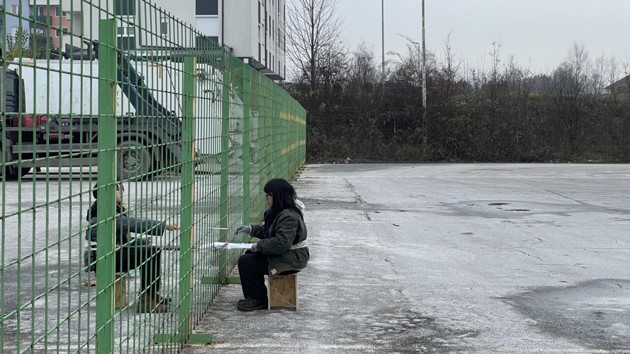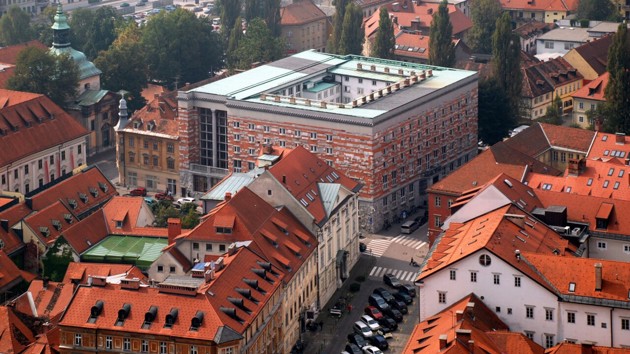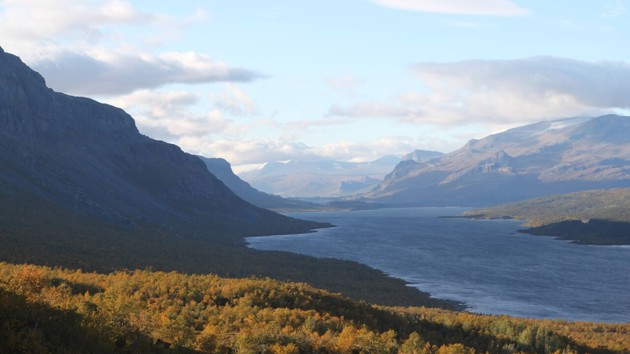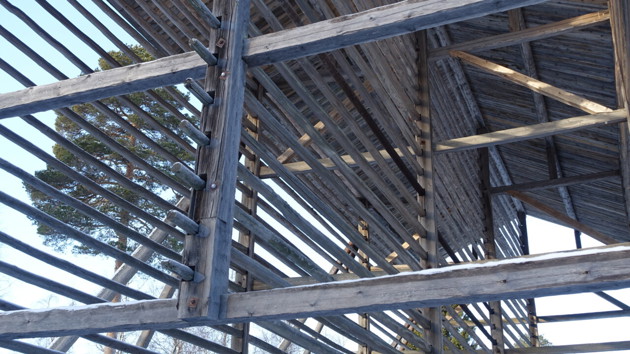Workshops 2023
The teaching consists of workshops and/or project work that can occur online or onsite. The forms of teaching can be practical exercises, individual tutorials, group discussions as well as seminars and field studies. Once accepted to the course students will have the opportunity to choose one of several workshops offered. Each workshop has a maximum number of students it can accept. If a student cannot get the chosen workshop she/he will be offered an alternative workshop. There might be costs for travel and accommodation for students related to a workshop. There will always be a workshop offered with no costs for travel or accommodation attached to it.
Architecture for Peace - CANCELLED!

ImageVernes Čaušević
Caption: A section of the inter-entity boundary line between Sarajevo and East Sarajevo.
Help build Sustainable Peace in a divided Europe Sarajevo, Bosnia & Herzegovina, summer 2023.
Continuing on from the successful UMA and Global Free Unit (GFU) Architecture for Peace Summer Course 2022 in Prijedor and the GFU Resilient Futures Autumn Workshop 2022 in Sarajevo, we invite you to join the GFU Sarajevo Classroom this summer 2023 to investigate the architecture of the inter-entity boundary line (IEBL) between communities in Sarajevo and East Sarajevo, which remain politically divided since the 1990’s Bosnian War, and design small-scale architectural interventions that facilitate peace-building.
This Summer Course will involve a 1-week field visit to Sarajevo. Students will learn experimental mapping techniques to investigate and record the spatial urban and architectural conditions of the IEBL in Sarajevo, and its development over 28 years since the Dayton Peace Agreement (1995). Students will work resourcefully and collaboratively to co-design a series of small-scale public architectural structures along the IEBL as a framework for reconciliation to rebuild social and ecological relationships in the divided communities. Your projects will initiate conversations with local NGO’s and partners for developing this work into Live Peace-building Projects to be further developed and potentially built in summer 2024.
This summer course will be delivered with local partners, including prizewinning UK- Bosnian architects Project V Architecture and peace-building Charity Most Mira, and in collaboration with Kharkiv School of Architecture, Ukraine. The workshop will include a visit to the international award-winning rammed earth Most Mira Peace Centre in Prijedor, planned for construction in 2023.
International students will work closely with B&H students from across the political divide, as well as with students from Ukraine and other current conflict and post-conflict places. Student work will be reviewed by international and local experts from the GFU network, which will include leaders of the Kharkiv School of Architecture (Ukraine). This workshop will build on the shared dialogue at the ‘Architecture on Stage: In The Fog of War’ Architecture Foundation event at the Barbican Centre curated by Robert Mull in Autumn 2021, drawing upon the experiences of Sarajevo, Beirut and Belfast to support Kharkiv to find pathways through and beyond the war.
Practical information: Students will be hosted by Project V Architecture and Most Mira and will need to cover their own travel and accommodation costs in affordable accommodation.
Summer Course Teachers:
Tutors: Prof. Robert Mull (Global Free Unit, University of Brighton and UMA) and visiting tutors: Vernes Causevic and Lucy Dinnen (Project V Architecture, GFU Sarajevo Classroom and MArch tutors at University of Sheffield School of Architecture).
Jože Plečnik at ground level: a travelling workshop - CANCELLED!

ImageElekhh, elek
Following UMA’s 2022 workshop studying the work of Alvar, Aino and Elisa Aalto ‘at ground level’ in Finland, in 2023 UMA will offer a travelling workshop through Germany, Austria and Slovenia to study the work of Jože Plečnik (1872 – 1957).
Plečnik studied under Otto Wagner and the Secessionists in Vienna. Working in Prague and Ljubljana, he built up a remarkable body of work drawing from classicism, Art Nouveau and early modernism.
During the trip, you will visit key examples of Plečnik’s work. You will evaluate his work’s spatial, aesthetic, technical and social aspects through drawings and text. You will be assessed through an illustrated travelogue/portfolio submitted online.
The workshop begins with a workshop in Umeå on Monday 12th June 2023. We will travel by train from Umeå to Ljubljana. We will leave Umeå by night train or early the next day. The workshop ends in Ljubljana at the end of the day on Monday 19th June. From there, you are responsible for your own onward travel.
This workshop can only be undertaken in person, and you will incur additional costs not applicable to the other workshops in the Summer Course. The cost of train tickets and shared accommodation (including couchette compartments on trains and hostel dormitories) are included in the workshop. You are responsible for the costs of food, subsistence, and materials.
Teacher: Dr. James Benedict Brown
Laponia

ImageMats Jacobsson
The summer course will take place in North of Sweden amongst the mountains of Laponia, Sapmi which is UNESCO world heritage site. Here the students will live within and learn about the history and contemporary social and economic relations that lays within the beauty of the sublime nature.
The context of Laponia articulates a global exploitational character of the Anthropocene era and its impact on our planet. It provides a tangible locally rooted case study with three different actors that live and work side by side with one another: the Sami people, an energy production company and the tourism. Once looked upon closely, the ever-present friction between economic, cultural and environmental perspectives can be observed. It forces one to take a critical standpoint that goes beyond the admiration of natural beauty of the area.
The aim of the summer course is to critically research and get first-hand information on the landscape and different actors in Laponia while being socially imbedded in the local context. Learning to notice, to reflect and to critically discuss how the history has affected the land and what invisible contemporary frictions shape the modern world. Besides our reflections we will develop a hands-on design skills through 1:1 scale built intervention as a tool of articulation of raised agendas. From research to interpretation, to projection.
The course will be conducted in distance learning in June and July. In August we will spend one week in a camping mode in mountains of Laponia. The program will include site visits, lectures, meeting local actors, design and build workshops and a cultural program.
Responsable teacher Toms Kokins
Teacher Maxine Lundström
Vernacular Architecture of the Nordic North

ImageKatrin Holmqvist Sten
Vernacular architecture is now the term most widely used to denote indigenous, tribal, folk, peasant and traditional architecture” (Encyclopedia of Vernacular Architecture, ed. Paul Oliver)
What can we learn from the vernacular architecture of the Nordic north? The course aims at investigating vernacular architecture of the north in Sweden, Finland and Norway focusing on aesthetic dimensions and choices, building technology, local materiality and building resources etc. The vernacular will be discussed in relation to local conditions such as cultural context(s), historical development, geographical features of the region and the contemporary situation of climate emergency and industrial and urban efforts. What can architectural practice gain from the vernacular in this region? What different approaches to vernacular architecture can be used by an architect? We will reflect on general theoretical and historiographical aspects, the role and impact of vernacular architecture today where neo-vernacular is emerging incorporating continuity with change.
The workshop will be held in Umeå in week 24 and 25 (Mon 12 June to Wed 21 June) and continue with online tutorials and final seminars in week 33. The workshop will include lectures by a variety of teachers, seminars, field studies and individual presentations. We will also work locally with Västerbottens museum/Gammlia and its range of regional buildings from the 17th century and onwards. During the intermediate period each student will work with an individual project which will be presented in August.
Responsible teacher: Katrin Holmqvist Sten
Latest update: 2023-05-23